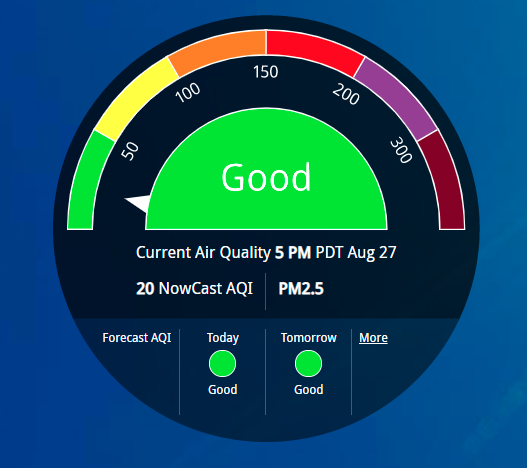PLU uses the following tools to track and monitor air quality in our region:
-
- Washington Air Quality Advisory: https://ecology.wa.gov/Research-Data/Monitoring-assessment/Washington-Air-Quality-Advisory
- Washington Smoke Information: https://wasmoke.blogspot.com/p/federal.html
- Washington Smoke Information – Mobile: https://wasmoke.blogspot.com/p/federal.html%5C)
- U.S. Environmental Protection Agency (EPA) AirNow: https://www.airnow.gov/
- Local Clean Air Agency Air Quality Network Map: http://map.pscleanair.org/?lat=47.6768311&lon=-122.4756425&z=9
The Washington Air Quality Advisory (WAQA) is similar to EPA’s national information tool, the Air Quality Index (AQI). Both use color-coded categories to show when air quality ranges from good to hazardous. The difference is that WAQA is based on lower levels of fine particle pollution than the federal AQI. While PLU relies on the AQI to determine the preventive measures to take, the WAQA provides a means to be alerted earlier – prior to the AQI reaching the actionable stage, and is useful for ensuring we act promptly before the air quality reaches a level where it can be harmful to sensitive groups. For this reason, the PLU EH&S manager subscribes to WAQA text alerts.
PLU employees who are most at risk are those who work in outdoor settings, such as Campus Safety, Facilities, and Athletics staff. However, because many indoor work locations at PLU use natural ventilation (open windows instead of air conditioning), even indoor workers have potential to be exposed to uncomfortable or harmful levels of smoke.

Interpreting the numbers
For ease of understanding and consistency, PLU will use the AQI provided by the State of Washington, US EPA, and Puget Sound Clean Air Agency. These numbers give a rating of the air quality, based on the level of particulates present, where readings show:
0 – 50: Good
51 – 100: Moderate
101 – 150: Unhealthy for sensitive groups
151 – 200: Unhealthy for everyone
201 – 300: Very unhealthy for everyone
301 – 500: Hazardous for everyone
Moderate: Air quality is acceptable. However, there may be a risk for some people, particularly those who are unusually sensitive to air pollution.
Unhealthy for sensitive groups: members of sensitive groups (elderly, children and people with heart or lung disease) who work outside should limit heavy exertion and take additional breaks. Individuals with asthma should follow their asthma action plans and keep quick relief medicine handy. Individuals with heart disease should monitor for shortness of breath, palpitations, or unusual fatigue.
Unhealthy for everyone: Sensitive groups should avoid prolonged or heavy exertion. These people should consider moving activities indoors or rescheduling. Individuals with asthma should follow their asthma action plans and keep quick relief medicine handy. Individuals with heart disease should monitor for shortness of breath, palpitations, or unusual fatigue. Everyone else, reduce prolonged or heavy exertion and take more breaks during outdoor activities.
Very unhealthy for everyone: Sensitive groups should avoid all physical activity outdoors. Individuals with asthma should follow their asthma action plans and keep quick relief medicine handy. Individuals with heart disease should monitor for shortness of breath, palpitations, or unusual fatigue. Everyone else should avoid prolonged or heavy outdoor exertions and consider moving activities indoors or rescheduling.
Hazardous for everyone: Everyone should avoid all physical activity outdoors. Sensitive groups should remain indoors and keep activity levels low.


